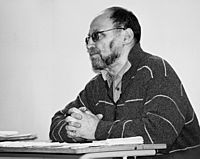Dmitri Prigov facts for kids
Quick facts for kids
Dmitri Aleksandrovich Prigov
|
|
|---|---|
 |
|
| Native name |
Дмитрий Александрович При́гов
|
| Born | 5 November 1940 Moscow, Soviet Union |
| Died | 16 July 2007 (aged 66) Moscow, Russian Federation |
| Occupation | Writer, artist |
| Nationality | Russian |
| Citizenship | |
Dmitri Aleksandrovich Prigov (Russian: Дми́трий Алекса́ндрович При́гов, born November 5, 1940, in Moscow – died July 16, 2007, in Moscow) was a very creative Russian writer and artist. He was known for his many poems, unique art, and plays. During the time of the Soviet Union, he was a dissident, meaning he disagreed with the government. Because of this, he faced some challenges, including being briefly sent to a special hospital in 1986.
Contents
Early Life and Artistic Beginnings
Dmitri Prigov was born in Moscow, which was then part of the Russian SFSR. He started writing poetry when he was a teenager. Even though he loved writing, he first studied to be a sculptor at the Stroganov Art Institute in Moscow. After that, he worked as an architect and also designed sculptures for city parks.
A Unique Artistic Career
Prigov was a leader in a special art movement called conceptual art, which began in the 1960s. He believed that performances could be a form of art. He was also famous for writing poems on unusual things, like tin cans!
A Prolific Poet
Dmitri Prigov wrote an incredible number of poems. By 2005, he had written almost 36,000 poems! For most of the Soviet era, his poetry was not allowed to be published officially. Instead, it was shared secretly through a system called Samizdat. This meant people would copy and pass around his writings by hand. His work was published in other countries and in academic journals long before it was officially available in Russia.
Facing Challenges
In 1986, Prigov was arrested by the KGB, which was the main security agency of the Soviet Union. He had been performing a street action, giving his poems to people passing by. He was sent to a psychiatric institution. However, other famous poets, like Bella Akhmadulina, protested his arrest. Because of their efforts, he was soon set free.
Official Recognition
After 1987, Dmitri Prigov's works finally started to be published and shown officially. In 1991, he joined the Writers' Union, a group for professional writers. He had already been a member of the Artists' Union since 1975.
His art was shown in the USSR in 1987 as part of "Unofficial Art" and "Modern Art" projects in Moscow. In 1988, he had his own exhibition in the USA, at Struve's Gallery in Chicago. After that, his works were shown many times in Russia and in other countries.
Beyond Poetry
Prigov was not just a poet. He also wrote novels, including Live in Moscow and Only My Japan. His artworks are even displayed at the Moscow Museum of Modern Art. He was truly a multi-talented artist, creating plays, essays, drawings, video art, and installations. He even performed music!
Prigov, along with philosopher Mikhail Epstein, helped introduce a new idea called "new sincerity". This idea was about finding a balance between being truly honest in art and using ideas from other works.
Awards and Legacy
In 1993, Prigov received the Pushkin Prize from the Alfred Toepfer Stiftung F.V.S. Later, in 2002, he won the Boris Pasternak Prize, another important award for writers.
Dmitri Prigov passed away from a heart attack in 2007, at the age of 66, in Moscow. He was planning a very unique performance at the time. He wanted to sit inside a wardrobe and read poetry while members of the Voina Group carried him up 22 flights of stairs at Moscow State University.
In 2011, the Hermitage Museum held a major exhibition of Prigov's art in Venice, Italy, during the 54th Biennale, which is a big art event.
Selected Films
Dmitri Prigov also appeared in a few films:
- Khrustalyov, My Car! (1998)
- Taxi Blues (1990)

